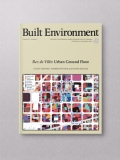Call for paper proposals: Special issue on resident-led housing
A future issue is proposed to interrogate the implications of collaborative self-organised housing for professions and professionals in the built environment. Issue editors Dr Jasmine Palmer & Dr Ir Lidewij Tummers are highly experienced both in co-housing practice and research, and have issued this call for paper proposals.
“The increase of resident-led housing: what implications for the professional housing sector?”
Abstract submission: 20 May 2018
New forms of self-organised housing are emerging in numerous locations around the globe, particularly in locations where regulated housing markets and state-provision for vulnerable households are affected by budget cuts and urban speculation, leaving the middle class at the urban periphery. Residents who join forces to act collectively to implement housing for their own use are known by terms as diverse as ‘building groups’ (Germany), ‘collective custom build’ (United Kingdom), ‘deliberative development’ (Australia) and ‘co-housing.’ ‘Collaborative housing’ has become an umbrella term for “initiatives where groups of residents collectively create living arrangements that are not easily available in the (local) housing market” (Tummers, 2015) and this housing sector is emerging and expanding in multiple locations around the globe.
Mainstream housing production primarily views residents as ‘clients’ or ‘beneficiaries’ in the system; participating, at best, in minor design choices to customize interior, and/or small management tasks. Through self-organisation and collaboration, future residents increase their influence on decision making, increasing housing choice. Self-organised housing initiatives can address affordability challenges and associated issues of social concern, such as care for the elderly, safe environments for children, environmental and community resilience and climate change. The built results often receive recognition for their architectural qualities, reduced costs, and sustainable outcomes. As such, there is interest from local authorities to integrate collective self-organised housing in urban policies and planning procedures.
While households engaging in self-organisation frequently seek to realise housing which diverges in some way from that provided by the market, their planning, construction and development inevitably takes place in the context of mainstream housing production. Households organising to self-commission, self-procure and self-manage housing clusters are often not equipped with the expertise required to articulate needs and negotiate the constraints and complexities of housing provision. Adding to the challenge, mainstream development partners (e.g., engineers, officials, housing associations, and financiers) frequently perceive such projects as complex, risky, and complicated. In locations where self-organisation is increasing, existing professional infrastructures need to adapt and new professions (e.g. facilitators) are emerging.
Notably absent from the existing literature is an understanding of how the (re-)emergence and growth of self-organised housing sectors in multiple jurisdictions impacts the roles of built environment professionals and professions. This issue aims to prompt discussion of how self-organisation transforms mainstream housing practices. Articles are invited from researchers and research projects globally. We particularly welcome papers that frame and compare the implications the growing collaborative self-organising housing sector has for building, planning and engineering professions and professionals. We encourage papers from different perspectives, disciplines, and geographies, which address one or more of the following:
- Professionals as agents of change in housing provision
- Shifting boundaries between professional disciplines in the provision and co-creation of housing
- New social, technical and financial professional roles and infrastructure to support collaborative housing
- Knowledge transfer, Terminology and professional discourse
- Institutionalisation, appropriation and commercialisation of the cohousing concept
- The roles of clients, end-users, formal commissioners and professionals in collaborative housing production
- Impact of collaborative housing on housing distribution systems
- Forward-thinking propositions for innovation in planning, design and building practice
Contributors are asked to theorize and contextualise the topic, based on empirical lessons from recent co-creation experiences, and/or critically reflect on and evaluate recent practices. Article proposals which employ cross-disciplinary research approaches and/or comparative analysis are encouraged, particularly where they provide opportunity for the internationalisation of learnings.
Submission Instructions:
This issue of Built Environment is to be edited by Jasmine Palmer (University of South Australia) and Lidewij Tummers (TUDelft). Interested authors should email a title and abstract of under 500 words to Jasmine Palmer prior to May 20th at [email protected].
Please feel free to contact the editors prior to the deadline for clarifications or to discuss your proposal: [email protected] or [email protected]
Schedule:
Call for proposals: March 19 2018.
Deadline for proposals: May 20 2018.
Invitations extended for the submission of full papers: July 1 2018
Full paper submission: December 1 2018
Papers resubmitted in response to peer review: May 2019
Expected publication, Autumn 2019
Reference:
Tummers, L. (Ed.), 2015. Taking apart co-housing. Towards a longterm perspective for collaborative self-managed housing in Europe (Introduction to the special issue). Urban Research and Practice, 8. https://doi.org/doi.org/10.1080/17535069.2015.1011421


